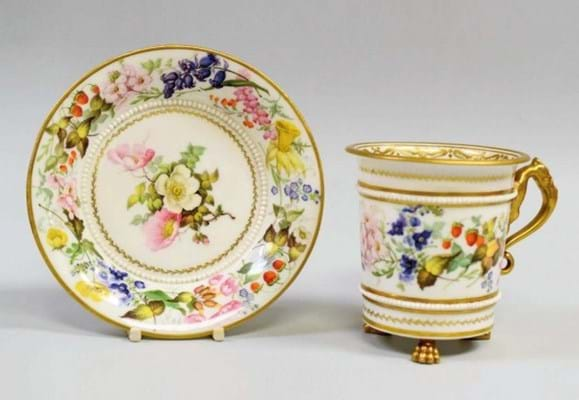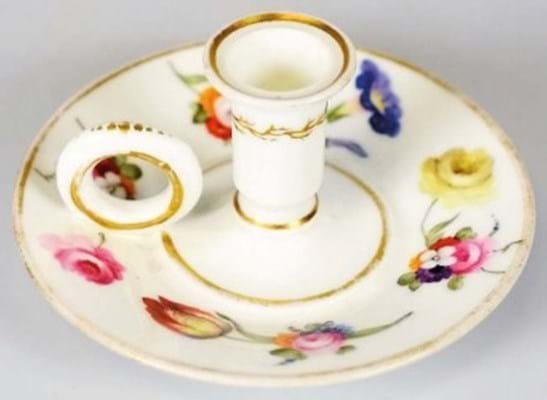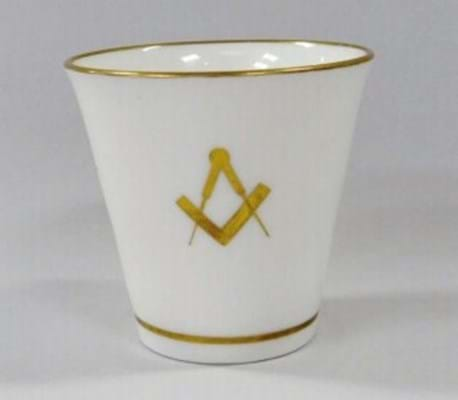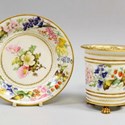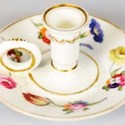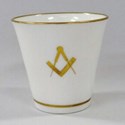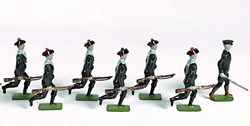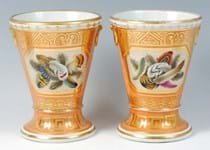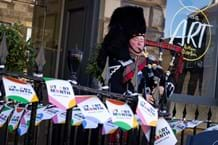Strong prices for Welsh porcelain – a market that has lagged in recent years – were posted by Rogers Jones’ (20% buyer’s premium) at the Welsh Sale in Cardiff on September 9.
Auctioneer Ben Rogers Jones believes the decision of vendors to sell close to the collecting base in Wales rather than as part of a more general ceramics sale in London, is making the difference.
Although not a wholly disinterested party, he did have a £10,500 Swansea cabinet cup and saucer and a £4200 Nantgarw tumbler to support his argument.
With the catalogue printed in Welsh as well as English, and the contents comprising Welsh art, books, ceramics and treen, the sale could scarcely have been more Cambrian, or, indeed, Cymreig.
“Our buyers in September were almost all Welsh collectors,” said Rogers Jones. “There was a record number of bidders and our sell through on the 472 lots was 89% – and rising with post-sale deals – and totalled £367,000.”
Pollard’s flowers
The gryphon-handled cabinet cup with three claw feet and 6in (15cm) diameter saucer was the outstanding lot among 25 pieces of Swansea.
The decoration of garden fruit and flowers was by the noted Swansea and Carmarthen painter William Pollard (1803-54). At £10,500, it doubled the £5000-6000 estimate, selling to a private collector.
From the same factory was a taperstick with a cylindrical nozzle and ring handle on a 2¾in (7cm) circular base bearing the red Swansea script mark. Finely decorated with four sprays of flowers, it was estimated at £800-1200 and sold at £2000.
The 3in (8cm) Nantgarw tumbler, estimated at £2500-3000, was made in 1819 and painted with Masonic symbols of the sun to one side and dividers and set square to the other. Only a single set of six was made – sold in 1821 at 4/6 per tumbler (about £25 today) to one Mr Hopkin-Jones. His receipt is signed Beeley, a pseudonym occasionally used by factory founder William Billingsley.
“One of the tumblers is in the National Museum. The whereabouts of the other four is unknown”
A degree of subterfuge was necessary. Before leaving the Flight, Barr & Barr Worcester factory for Wales, Billingsley had signed a contract preventing him disclosing porcelain recipes but not barring him from producing his own porcelain.
One of the tumblers is in the National Museum in Cardiff. The whereabouts of the other four is unknown.
Another star among the 11 pieces of Nantgarw was a c.1818-20 tureen, cover and stand from the famous Brace Service. Picked out in gold and painted with fruit, flowers and exotic birds, it made a lower-estimate £3000.
Unsold in the room, but an aftersale at the £3000 top estimate was a garniture trio of covered vases with gryphon handles and geometric piercing by the 1822-46 Stoke factory H & R Daniel. The primary appeal was the panel of decoration – garden scenes and roses – by the aforesaid William Pollard.
Welsh to its core is Ewenny Pottery. Since 1427 there have been 15 potteries in or around the Vale of Glamorgan village.
Today’s pottery was established by the Jenkins family in the early 19th century and the eighth generation of the family – ceramics graduate Caitlin – is working with her parents there.
At Rogers Jones, half a dozen 19th century Ewenny vases all got away above estimate led by a green-glazed 6¾in (17.5cm) tall vase or jug impressed Jones Ewenni and Bridgend and inscribed with the bardic sentiment Y Gwir yn Erbyn y Byd [The Truth Against the World].
Estimated at £40-60 it went to a Welsh collector at £140.
Other things Welsh included a Brynmawre joined oak armchair (£520) and a slate desk stand (£100) both provenanced to the Glamorgan home of poet and historian Iorweth ‘Cyfeiliog’ Peate.
Paintings from the sale feature in this week’s Art Market.
Ewe had to laugh…
There are many reasons for attending a Rogers Jones sale but Ben Rogers Jones hinted that stand-up comedy at its unintentional best could be one.
At a recent picture sale, his father David, a veteran with more than 50 years of experience at the rostrum, was urging recalcitrant farmers in the room to keep bidding on a decent oil depicting sheep.
They were fine animals, he pointed out, and what’s more they wouldn’t require the mucky business of cleaning their rumps or the laborious work of removing their wool. “You won’t have to dag or shear them,” he said. Or, rather, that’s what he meant to say.
David’s unfortunate spoonerism “held up the sale for ten minutes with people laughing,” reports Ben.


